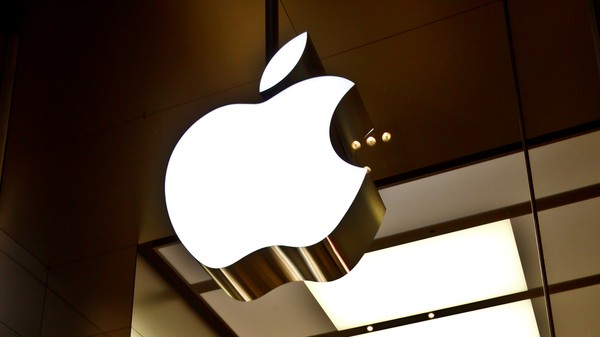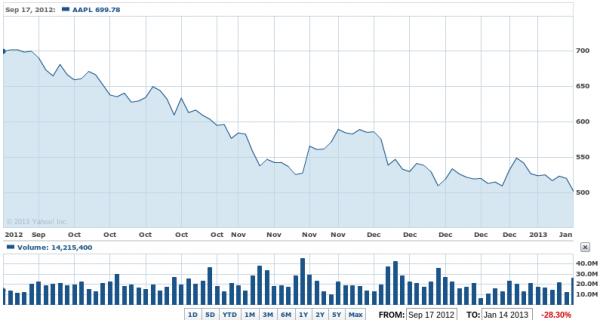What's rotting Apple?

I'm not an investor or financial analyst. But I do have a measure of commonsense. Lots of people are asking about Apple's falling stock price and why it is. You don't need a MBA or ponder price-earnings ratios to, by commonsense, see what's happening. Apple is undergoing a long-overdue course correction. It's the new normal, baby, get used to it.
Analysts making wild-eyed predictions just months ago about $1,000 a share or bloggers banging keyboards about $1 billion market capitalization are nutty fruitcakes. Apple cofounder Steve Jobs is gone, so they made their own Kool-Aid and spiked it. They're the only thing getting high here. Apple is laid low.
I know. I know. The concept confuses you, because Apple flew high for so long, rakes in more dough per quarter than the next couple big tech companies combined and sits on a mountain of cash. (Say, can Hubble see the far reaches of this $120 billion stack?)
Save Us, Lord!
Apple believers, the so-called cult of worshipers, clasp there hands and look to the Heavens (where they hope Jobs resides) looking for a reason. The justifications surely are amazing. Over at the Apple 2.0 blog, Philip Elmer-DeWitt asks the common question: "If Apple is about to report its best ever quarter, why does the stock keep falling?" He struggles because the falling share price -- down 32 percent at market close today from September's all-time high -- doesn't reconcile with his pretty performance charts for fourth calendar quarter.
Financial analysts and armchair investors can talk numbers until the rest of us gasp for air because of all the oxygen sucked out of the room. But people make many decisions based on emotions and perception. With a company like Apple, where image and perception are intertwined with marketing and product design, how people feel really matters -- and many people aren't exactly feeling good about the fruit-logo, including some of the aforementioned fruitcakes.
For many people, investing is an act of faith. For many others, it's about making a quick buck. Both types meet at the gut-feeling level -- that fear of losing everything or excitement of winning big suddenly. Behind it all is perception. Think! Why else can one rumor send any stock soaring or tumbling, regardless of the company's performance.
As I explained last month, Apple has a huge perception problem. Perceived or real missteps mute people's good feelings and confidence in Apple: Patent lawsuits; iPhone 5 lackluster features; iPad mini pricing; and Apple Maps, among many others. Then there is what's missing: Steve Jobs spinning every little thing into one more big thing. The magician is gone and the hypnotic magic with him.
The Bubble Bursts
There's a strangely appropriate metaphor, analogy really, to Apple's share price rot.
In 2004, my family looked at buying a home in suburban Maryland. The general perception: Housing was a good investment; borrowing was cheap, loans were easily gotten and home equity kept rising. I couldn't go a day without someone telling me to buy. Everyone I knew either was buying new or moving somewhere else. My local bank extended hours to 7 pm weekdays and 4 pm on Saturday. Home buying was easy.
But as we shopped for a house, something didn't feel right. After extensive research and observing the skewed ratio of rents to mortgages, I understood and told my wife that a housing bubble had formed and we wouldn't buy. In a normal market, mortgages and rents should be about the same, but the former were about 35 percent higher nationwide and 40 percent in our area; that indicated over-inflated house prices.

Mortgage-to-rent ratios are actually quite similar to P/E. The experts look at price-earnings ratios and try to reconcile Apple's performance potential against its falling share price. I see a trend not-so dissimilar from the housing boom in reverse. Home prices are actually quite arbitrary, lifted as much by perception based on numerous factors including what something else in the neighborhood sells for. Your neighbor takes in an extra 100 grand, and your home's value rises, too. The bank forecloses on his property and a couple others, and your home loses value. There are lots of other factors like supply and demand, but surely you get the point. Home values and stock prices are greatly influenced by perception.
Anyone doing mortgage-to-rent evaluations in the mid-Noughties could see a reality separate from general perceptions about home buying. Similarly, those folks looking at Apple metrics, P/E among them, surely wonder about reality being seemingly detached from perception. They're right to ask, yet wrong to do so. Because Apple has long been a perception stock. There's little rational about how people feel about the company, and if you disbelieve that statement look to this story's comments and others about Apple.
The falling stock price is a fundamental realignment with sentiment and people's feelings that Apple isn't sustainable. Everything looks good, considering products so well-positioned for the so-called post-PC era. But a crop so dependent on brand perceptions is ripe for pestilence. Mmmm. Have I mixed enough metaphors?
Photo Credit: nui7711/Shutterstock